Literature
- Home
- Literature
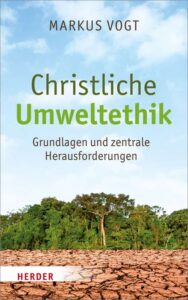
Markus Vogt: Christian Environmental Ethics.
Foundations /Fundamentals and central challenges.
This book offers a systematic reflection on environmental ethics that addresses the manifold/varied tensions between the normative claims of climate and environmental protection and the conditions of social transformation. In doing so, it considers religion as an essential factor in a cultural revolution that overcomes the obliviousness to nature in the ideas of the good life and the design of social structures. In 22 chapters, authoritative environmental-ethical theoretical models, eco-theological depth dimension, and practical fields of action are explored. The result is a comprehensive compendium of ecological social ethics.
2021, Herder, Freiburg, 784 Pages
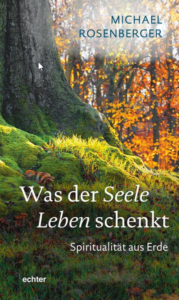
Michael Rosenberger: What gives life to the soul.
Spirituality from earth
"What do you live from? What helps you to live intensely, attentively and consciously?" Thus asks a "spirituality from below," a "spirituality from earth," which renounces flights of thought and remains on the ground. Such a spirituality can only start from basic human experiences and be developed in broad ecumenism. This has a great advantage: it is simple in the sense of "elementary" and "uncomplicated". In the 2000 years of their existence, the Christian churches have made the edifice of faith and spiritual practice more and more complicated. The solution to this hyper-complexity is a reflective "back to the roots" and the restriction to a few, anthropologically basic, yet demanding impulses and practices.
In this sense, Michael Rosenberger opens up the core of a spirituality accessible to all people, in order to gain orientation from it for the practical organization of life.
2020, Echter, 216 Pages.
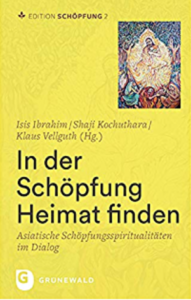
Ibrahim, Isis (ed. et al.)(Publishers and others): Finding Home in Creation. Asian Creation Spiritualities in Dialogue
How should and do we want to live together in creation? How can responsibility for creation be shaped in a contemporary way in view of the climate crisis? In view of the threat to the earth as a habitat, religions can make an important contribution to a contemporary environmental ethic. The aim of this volume is to bring the major Asian religions into dialogue with each other in order to tap (explore) their religious potential for the benefit of our common habitat Earth. At the same time, their specific creation narratives, their respective spiritual worldviews and the ethical principles rooted in them are presented, discussed and made fruitful for a cooperation in the responsibility for creation. In doing so, cultural and religious differences are by no means negated. Rather, alterity is recognized as a special value, because it expresses precisely what individual religious communities can bring to interreligious exchange as their specific characteristic.
2020 Matthias-Grünewald-Verlag, 330 pages
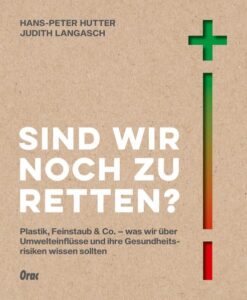
Hutter, Hans-Peter/Langasch, Judith: Sind wir noch zu retten. Plastic, fine dust & Co.: What we should know about environmental influences and their health risks
Pesticides, cell phone radiation, particulate matter, noise - all of these have an unnoticed effect on our health and well-being every day. Not only since the Corona crisis has health been one of the defining issues in (our) society. Increasingly, it is about the direct burden that we accept - or even cause ourselves - through our way of life in industrialized countries. But what are the most dangerous factors, the worst pollutants, and how should we deal with them? What influences do we need to protect ourselves from? What role do individual consumer decisions play? And what do environmental protection and the climate crisis actually have to do with social inequality? In light-hearted yet informative conversations, journalist Judith Langasch elicits the latest findings and merciless truths about environmental influences from environmental physician Hans-Peter Hutter and asks the all-important question: Can we still be saved?
2021 Orac, 216 pages
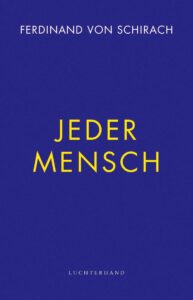
von Schirach, Ferdinand: Every human being
Ferdinand von Schirach, (lawyer and writer), argues for expanding the Charter of Fundamental Rights of the European Union. "I am anything but a political activist," he says of himself. "I'm not at all suited to be a revolutionary, and I've never been to a demonstration in my life." Now, however, he has published a small booklet in which he argues for an extension of the Charter of Fundamental Rights of the European Union. It is about a European right to informational self-determination and about a right that can be enforced in European courts "that statements made by public officials correspond to the truth. Ferdinand von Schirach pleads for the following fundamental rights, among others: Article 1 - Environment Everyone has the right to live in a healthy and protected environment. Article 5 - Globalization Everyone has the right to be offered only such goods and services as are produced and rendered with due regard for universal human rights.
2021, Luchterhand, 32 pages
https://www.ndr.de/kultur/buch/Jeder-Mensch-Neues-Buch-von-Ferdinand-von-Schirach,schirach128.html
Cooperation: Dr. Walter Kühnelt
